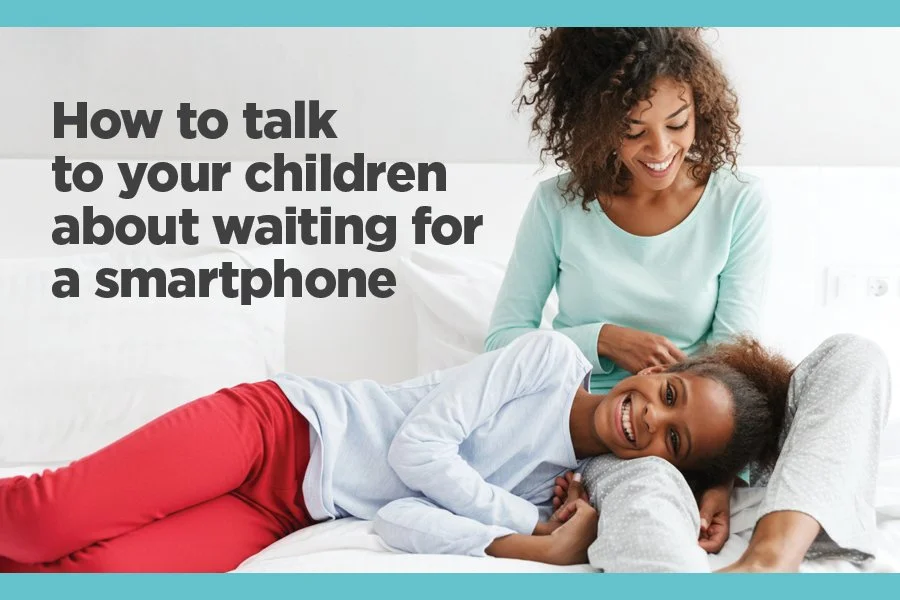20 Ways to Answer Their Question About Why They Can’t Have a Smartphone
Deciding when your child should have a smartphone is one of the biggest parenting questions today. With so much pressure from peers and technology all around, it can feel overwhelming to know what to say and when. This guide is here to support you with thoughtful, simple ways to explain to your children why your family is choosing to wait—helping you have honest, loving conversations that build trust and confidence for both you and your child.
1. Tune In to Their Feelings
Start by letting your child know you understand. When kids feel seen and heard, they’re more willing to listen. This is about love and connection, not control.
“I know it’s hard when friends have phones and you don’t. It’s normal to feel left out—and I see that.”
2. Keep It Simple, Truthful, and Age-Appropriate
Kids don’t need a full TED Talk—but they do need to understand why you’re making this decision. Emphasize one of these points:
“Phones are designed to keep you staring at them. That might sound fun, but it makes your brain tired and stressed. We want to give your brain time to grow strong—without all that noise.”
“Phones weren’t designed for kids. The nonstop scrolling, videos, and messages can overload your brain and affect how you feel. We want to protect your awesome brain while it’s still growing.”
3. Teach the Power of Presence
Kids need to know that presence is powerful—and that the best parts of life happen when we’re fully in the moment.
“Being present with people is one of the most important skills you can have—and one of the most meaningful. When you're not distracted by a screen, you notice more, connect more, and create the kind of memories that shape who you are.”
4. Emphasize How Delaying Gives Them Freedom to Be a Kid
Put the spotlight on freedom and fun.
“Waiting means more time to be silly, spontaneous, and unplugged. No buzzing notifications. No online drama. Just freedom to play, explore, and grow at your own pace.”
5. Explain How Apps Are Built to Keep You Hooked
Help your child understand how apps are designed to pull them in by sharing one of these simple, honest explanations:
“Ever wonder why it’s so hard to put your phone down? That’s on purpose. Apps are designed to keep you clicking—even if it stresses you out. They make money every time you scroll. But your mind should feel calm, not crowded.”
“These apps are built to hook you. The more you scroll, the more they learn—and the harder it is to stop. Even if what you're seeing makes you anxious or sad, they keep sending more. Why? Because your attention makes them money. But your attention—and your peace of mind—is worth more than that.”
“These apps aren’t made to help you—they’re made to use you. The more you scroll, the more they profit. But your time, your focus, and your mental health? They’re way too valuable to trade away.”
6. Dive Into How This Is More Time for What Matters
It’s not just about what they’re missing—it’s about what they gain.
“Without a phone, you have more time for what matters—playing, being creative, hanging out with friends, laughing, making up games. You get to just be a kid a little longer.”
7. Talk About Safety in a Calm, Age-Appropriate Way
It’s important to help kids understand the risks without overwhelming them.
“We know one day you’ll be online more, and we’ll help you get ready for that. But right now, some things just aren’t safe for kids to see or deal with. That’s why we’re waiting—to make sure you’re protected and prepared when the time comes.”
“Not everything online is safe for kids. Some stuff can be confusing or upsetting—and sometimes people pretend to be someone they’re not. We’re helping you wait because your safety comes first. When you’re older, we’ll teach you how to be smart and safe online.”
“Some things on the internet aren’t kind, or even true. Sometimes people pretend to be someone else or share things that don’t make sense for kids to see. You don’t need to worry about that right now—our job is to keep those things away from you until you're ready to understand them.”
8. Share the Role Smartphones Play in Shaping Self-Worth
Smartphones expose kids to nonstop comparison—something their growing brains and hearts aren’t built to handle just yet.
“Most of what you see online isn’t real life—it’s the highlight reel. People post the best parts, use filters, and leave out all the boring or hard stuff. When you see that all the time, it can make you feel like you’re not measuring up. But you’re amazing just the way you are, and I don’t want a phone making you forget that.”
9. Talk about how Phones Interrupt Sleep
Kids may not realize how much smartphones can impact their body, especially sleep.
“Using phones too much can mess with your sleep, and sleep is when your brain and body do their best growing. Even adults struggle with this, so we’re trying to help you build healthy habits now.”
10. Stress that Learning Focus Takes Practice
Attention is like a muscle—and smartphones can weaken it over time.
“Learning how to focus, think deeply, and be creative takes time and practice. Phones can get in the way of that by constantly interrupting your thoughts. We want to help your brain stay strong and focused, not scattered.”
11. Explain how Face-to-Face Skills Matter More Than Ever
Smartphones can erode communication skills that kids need in real life.
“Talking, listening, making eye contact, dealing with awkward moments—all of that takes practice. Phones make it easy to avoid real conversations, but those are the skills that build confidence and close friendships.”
12. Bring it Back to Your Relationship with Your Child
Let them know this is also about your relationship with them and how you desire real connection.
“When phones are in the picture, sometimes people stop talking or sharing what’s really going on. We want to stay close and connected while you’re growing up—not let a screen get in the way.”
13. Share how Smartphones Can Add Pressure
Even kids admit phones can feel like a job—keeping up with texts, group chats, apps, social media, etc.
“Having a phone can make you feel like you always must be available, answer right away, or keep up with everything. That kind of pressure isn’t something you need right now. Your time and energy should go toward things that make you feel good, not overwhelmed.”
14. Talk About How Phones Can Affect Growing Brains
Kids’ brains are still growing and changing—and too much screen time can get in the way of that.
“Your brain is still growing every day, and that’s amazing. But scientists have found that using screens too much—like phones, tablets, or video games for hours—can change how your brain grows. That’s one of the big reasons we’re waiting. We want to give your brain the best chance to grow strong, healthy, and focused.”
15. Discuss How Phones Can Open the Door to Cyberbullying
Smartphones can make it easier for kids to get hurt—or hurt others—without meaning to.
“Sometimes people use phones to say mean things through texts or apps. That’s called cyberbullying, and it can really hurt. Research shows that kids who get phones earlier are more likely to be part of it—either by being bullied or by saying something hurtful themselves. We’re waiting because we want to protect you from that kind of hurt and help you grow up kind, strong, and safe.”
16. Talk About How Phones Can Affect Mental Health
Too much screen time—especially social media—can make kids feel anxious, sad, or like they’re not enough.
“The more time kids spend on social media, the more likely they are to feel stressed, sad, or anxious. Phones can also overstimulate your brain and make it harder to feel calm. We’re waiting because your mental health matters—and we want to protect your heart and your happiness.”
17. Explain There’s No Real Need Yet
Help kids see that they’re not missing out on anything essential for this stage of life.
Talking point:
“You don’t need a smartphone to talk to friends, learn new things, or have fun. There are other ways to stay connected that fit your age better and don’t come with all the distractions and stress.”
18. Discuss how No One-Size-Fits-All Families
Every family makes decisions based on their values and needs.
“Different families have different timelines—and that’s totally okay. We’re choosing what fits our family and helps you grow in the healthiest way.”
19. Communicate how Collective Action Makes a Big Difference
This is especially relevant to Wait Until 8th and can help ease kids' FOMO.
“You’re not the only one waiting. There are thousands of families doing this together so kids like you don’t have to feel alone. When we make decisions as a group, we help each other stay strong and change things for the better.”
20. Conclude with You’ll Have a Phone with Purpose Later
End the conversation with hope and clarity. Help kids see that tech will be part of their life—but in a way that serves them, not the other way around.
“One day, you’ll have a phone, but we want to help you use it with purpose—not just out of habit. Waiting helps you get ready to use tech in a way that adds to your life instead of distracting you from it.”
“We’re not saying ‘never.’ We’re saying, ‘not yet.’ And we’ll keep talking about it as you grow. When the time is right, we’ll make that decision together.”
Waiting isn’t just about saying no to a phone—it's saying yes to childhood.
Yes to real friendships. Yes, to curiosity and play. Yes, to growing up at a healthy pace. When we wait together, we give kids the space to be kids—before they step into a world that asks them to grow up too fast.
Ready to Take the Next Step?
Join thousands of families choosing to wait by taking the Wait Until 8th pledge today. By committing to delay smartphones, you’re protecting your child’s childhood, encouraging real connections, and giving them the gift of growing up at their own pace. Together, we can make a difference—one conversation at a time.
Join the movement: Take the Wait Until 8th pledge today.


